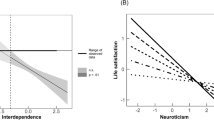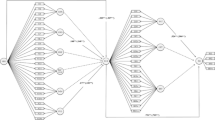Abstract
This study explored the mediating processes underlying the associations between autonomy and subjective well-being (SWB), and those between personality and affective well-being. Using the World Values Survey dataset from Singapore, the results showed that autonomy and financial satisfaction were the strongest predictors of life satisfaction and happiness, whereas personality traits were the strongest predictors of positive feelings. Both personality and material concerns predicted negative feelings to some extent. Mediation analyses showed that the associations between autonomy and SWB, and those between personality and positive and negative emotions were mediated by material concerns. Thus, this study illustrates the process models of different SWB facets (life satisfaction, happiness, positive and negative emotions) and highlights that dispositional factors (extraversion, neuroticism, agreeableness, and autonomy) can exert both direct and indirect effects (via material factors) on SWB.

Similar content being viewed by others
Notes
Material concerns can be represented by indicators such as financial satisfaction and satisfaction with standard of living. Fulfilling/meeting one’s material concerns is associated with higher life satisfaction (e.g., Delhey 2010; Diener et al. 2010). In contrast, materialism reflects the prioritization of the pursuit and acquisition of wealth and material goods. It is inversely associated with SWB (Diener and Oishi 2000; Kashdan and Breen 2007). Hence, materialism should not be equated with material concerns.
Additional hierarchical linear regression analyses were also conducted, for which the order was reversed, i.e., indicators of material concerns were added in the first step, values were added in the second, and personality variables were added in the last step. This ordering however, is less ideal than the original main analyses, because bottom-up factors (e.g., material indicators) can be influenced by dispositional factors like personality. The main analyses (by examining personality factors first and bottom-up factors in the last step) can address whether material indicators (by themselves) still explain any additional variance after accounting for personality. However, in these supplementary analyses, the variance explained by material indicators (in the first step) can be due to objective material circumstances, as well as personality influences on the evaluation of the financial situation, which suggests that the impact of the material factors may be overinflated. Overall, both the main and supplementary analyses yielded similar patterns of results—material concerns and values explained most of the variance in life satisfaction and happiness, whereas personality accounted for most of the variance in positive emotions.
All three indicators of material concerns were included in the preliminary mediation analyses that separately examined extraversion, agreeableness, and neuroticism. However, as the other two indicators of material concerns (financial satisfaction or satisfaction with standard of living) were not significant predictors of positive feelings, the final analysis that examined only the mediating effect of income status was reported. Also, agreeableness and neuroticism were not significantly associated with income status, thus only the final analysis for extraversion was reported.
All three indicators of material concerns were included in the preliminary mediation analyses that separately examined extraversion, neuroticism, conscientiousness, and agreeableness. The analyses for extraversion and conscientiousness found no significant mediating effects of material concerns. As neuroticism and agreeableness were not significantly associated with income status, their final analyses included only the other two material concerns indicators.
Mediation analysis was not conducted for positive feelings because autonomy was not a significant predictor of positive feelings.
References
Deaton, A. (2008). Income, health, and well-being around the world: Evidence from the Gallup World Poll. Journal of Economic Perspectives, 22, 53–72.
Delhey, J. (2010). From materialist to post-materialist happiness? National affluence and determinants of life satisfaction in cross-national perspective. Social Indicators Research, 97, 65–84.
DeNeve, K. M., & Cooper, H. (1998). The happy personality: A meta-analysis of 137 personality traits and subjective well-being. Psychological Bulletin, 124, 197–229.
Depue, R. A., & Collins, P. F. (1999). Neurobiology of the structure of personality: Dopamine facilitation of incentive motivation and extraversion. Behavioral and Brain Sciences, 22, 491–569.
Diener, E. (1984). Subjective well-being. Psychological Bulletin, 95, 542–575.
Diener, E. (2000). Subjective well-being: The science of happiness and a proposal for a national index. American Psychologist, 55, 34–43.
Diener, E., & Diener, M. (1995). Cross-cultural correlates of life satisfaction and self-esteem. Journal of Personality and Social Psychology, 68, 653–663.
Diener, E., & Lucas, R. E. (1999). Personality and subjective well-being. In D. Kahneman, E. Diener, & N. Schwarz (Eds.), Well-being: The foundations of hedonic psychology (pp. 213–229). New York: Russell Sage Foundation.
Diener, E., Ng, W., Harter, J., & Arora, R. (2010). Wealth and happiness across the world: Material prosperity predicts life evaluation, while psychosocial prosperity predicts positive feeling. Journal of Personality and Social Psychology, 97, 143–156.
Diener, E., & Oishi, S. (2000). Money and happiness: Income and subjective well-being across nations. In E. Diener & E. M. Suh (Eds.), Culture and subjective well-being (pp. 185–218). Cambridge, MA: MIT Press.
Diener, E., Suh, E. M., Lucas, R. E., & Smith, H. (1999). Subjective well-being: Three decades of progress. Psychological Bulletin, 125, 276–302.
Diener, E., Tay, L., & Oishi, S. (2013). Rising income and the subjective well-being of nations. Journal of Personality and Social Psychology, 104, 267–276.
Gray, J. A. (1981). A critique of Eysenck’s theory of personality. In H. J. Eysenck (Ed.), A model for personality (pp. 246–276). New York: Springer.
Heller, D., Watson, D., & Ilies, R. (2004). The role of person versus situation in life satisfaction: A critical examination. Psychological Bulletin, 130, 574–600.
Howell, H., & Howell, C. (2008). The relation of economic status to subjective well-being in developing countries: A meta-analysis. Psychological Bulletin, 134, 536–560.
Inglehart, R., Foa, R., Peterson, C., & Welzel, C. (2008). Development, freedom, and rising happiness: A global perspective. Perspectives on Psychological Science, 3, 264–285.
Johnson, W., & Krueger, R. F. (2006). How money buys happiness: Genetic and environmental processes linking finances and life satisfaction. Journal of Personality and Social Psychology, 90, 680–691.
Kahneman, D., & Deaton, A. (2010). High income improves evaluation of life but not emotional well-being. Proceedings of the National Academy of Sciences, USA, 107, 16489–16493.
Kahneman, D., Krueger, A. B., Schkade, D., Schwarz, N., & Stone, A. A. (2006). Would you be happier if you were richer? A focusing illusion. Science, 312, 1908–1910.
Kashdan, T. B., & Breen, W. E. (2007). Materialism and diminished well-being: Experiential avoidance as a mediating mechanism. Journal of Social and Clinical Psychology, 26, 521–539.
Larsen, R. J., & Ketelaar, T. (1991). Personality and susceptibility to positive and negative emotional states. Journal of Personality and Social Psychology, 61, 132–140.
Lucas, R. E., & Diener, E. (2000). Personality and subjective well-being across the life span. In D. L. Molfese & V. J. Molfese (Eds.), Temperament and personality development across the life span (pp. 211–234). Mahway, NJ: Lawrence Erlbaum Associates.
Lucas, R. E., & Fujita, F. (2000). Factors influencing the relation between extraversion and pleasant affect. Journal of Personality and Social Psychology, 79, 1039–1056.
Lucas, R. E., & Schimmack, U. (2009). Income and well-being: How big is the gap between the rich and the poor? Journal of Research in Personality, 43, 75–78.
McCrae, R. R., & Costa, P. T. (2008). The five-factor theory of personality. In O. P. John, R. W. Robins, & L. A. Pervin (Eds.), Handbook of personality: Theory and research (pp. 159–181). New York: Guilford Press.
Ng, W., & Diener, E. (2014). What matters to the rich and the poor? Subjective well-being, financial satisfaction, and post-materialist needs across the world. Journal of Personality and Social Psychology, 107, 326–338.
Ng, W., Diener, E., Arora, R., & Harter, J. (2009). Affluence, feelings of stress, and well-being. Social Indicators Research, 94, 257–271.
Ozer, D. J., & Benet-Martínez, V. (2006). Personality and the prediction of consequential outcomes. Annual Review of Psychology, 57, 401–421.
Peterson, C. (1999). Personal control and well-being. In D. Kahneman, E. Diener, & N. Schwarz (Eds.), Well-being: The foundations of hedonic psychology (pp. 288–301). New York: Russell Sage Foundation.
Peterson, C., & Seligman, M. E. P. (1984). Causal explanations as a risk factor for depression: Theory and evidence. Psychological Review, 91, 347–374.
Preacher, K. J., & Hayes, A. F. (2008). Asymptotic and resampling strategies for assessing and comparing indirect effects in multiple mediator models. Behavior Research Methods, 40, 879–891.
Rammstedt, B., & John, O. P. (2007). Measuring personality in one minute or less: A 10-item short version of the Big Five Inventory in English and German. Journal of Research in Personality, 41, 203–212.
Roberts, B. W., Caspi, A., & Moffitt, T. E. (2003). Work experiences and personality development in young adulthood. Journal of Personality and Social Psychology, 84, 582–593.
Schimmack, U., Radhakrishnan, P., Oishi, S., & Dzokoto, V. (2002). Culture, personality, and subjective well-being: Integrating process models of life satisfaction. Journal of Personality and Social Psychology, 82, 582–593.
Schwartz, B. (2004). The paradox of choice: Why more is less. New York: Ecco Press.
Steel, P., Schmidt, J., & Shultz, J. (2008). Refining the relationship between personality and subjective well-being. Psychological Bulletin, 134, 138–161.
Tay, L., & Diener, E. (2011). Needs and the subjective well-being around the world. Journal of Personality and Social Psychology, 101, 354–365.
Watson, D., & Clark, L. A. (1992). On traits and temperament: General and specific factors of emotional experience and their relation to the five-factor model. Journal of Personality, 60, 441–476.
Welzel, C., & Inglehart, R. (2010). Agency, values, and well-being: A human development model. Social Indicators Research, 97, 43–63.
Author information
Authors and Affiliations
Corresponding author
Rights and permissions
About this article
Cite this article
Ng, W. Processes Underlying Links to Subjective Well-being: Material Concerns, Autonomy, and Personality. J Happiness Stud 16, 1575–1591 (2015). https://doi.org/10.1007/s10902-014-9580-x
Published:
Issue Date:
DOI: https://doi.org/10.1007/s10902-014-9580-x




